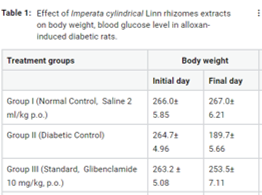Abstract
The anti-diabetic effect of ethanolic and aqueous extracts of Imperata cylindrical rhizomes was investigated in alloxan-induced diabeties in rats. Diabetes was induced by a single 150 mg/kg intraperitoneal dose of alloxan. Rats were divided into five groups with six rats in each group i.e. the normal control group, diabetic control group, standard group (glibenclamide, 10mg/kg, p.o.), Test-I group (200 mg/kg ethanolic extract) and Test-II group (200 mg/kg aqueous extract). The above concerned groups were inoculated on 21st day. On the last day of the experiment, fasted rats were killed by cervical dislocation. The body weight was measured at the initial day and final day. The blood samples were collected for estimation of glucose. The loss of body weight in control group, but recovery was observed in drug treated group. The serum glucose level was significant increased in diabetic rats. However, significant improvement was observed in treated group. The biochemical parameters such as HDL and proteins level were decreased in the control group but maintained in drug treated group. LDL, cholesterol, triglyceride creatinine and urea were significant increase in control group however, reduced level in drug treated group. The present study concluded that ethanolic and aqueous extracts of I. cylindrical rhizome showed an appreciable effect in reducing the hyperglycemia and the complications associated with diabetes. However, aqueous extract is found more significant in decreasing blood glucose level in comparison to the ethanolic extract. The study results justify the traditional use of the plant as anti-diabetic.
Full text article
Authors

This work is licensed under a Creative Commons Attribution-NonCommercial-NoDerivatives 4.0 International License.

